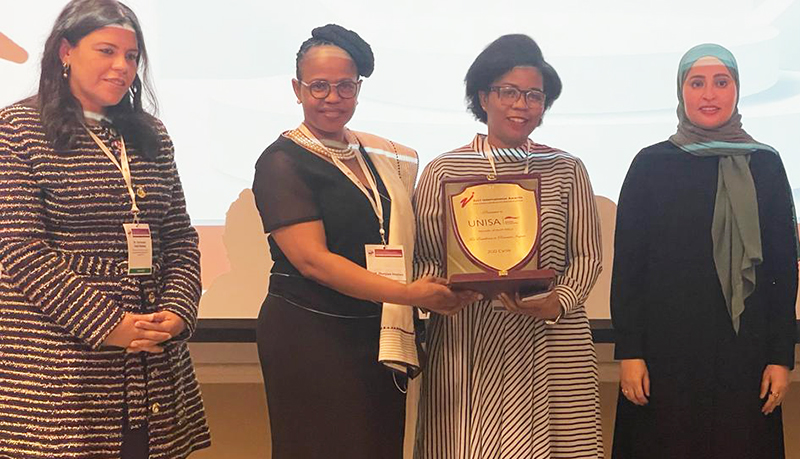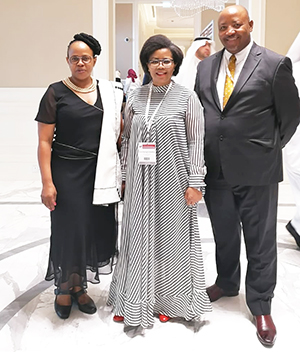News & Media
International award for Unisa’s excellence in impactful research

Dr Narimane Hadj-Hamou (CLICKS CEO), Prof Thenjiwe Meyiwa (Unisa VP), Prof Puleng LenkaBula (Unisa VC) and Her Excellency Ohood Bint Khalfan al Roumi (Minister of State for Government Development and the Future, United Arab Emirates).
Recognised among ninety applications received from thirty-one countries, Unisa won an award at the Zairi International Awards for Excellence in Higher Education. The award was accepted by Unisa Principal and Vice-Chancellor, Professor Puleng LenkaBula at the opening ceremony of the 5th MENA Higher Education Leadership Forum on the morning of the 23rd of March 2022, in Dubai.

Prof Thenjiwe Meyiwa (VP: Research, Postgraduate Studies, Innovation and Commercialisation), Prof Puleng LenkaBula (VC: Unisa) and Dan Mosia (Principal, and Deputy Chairperson of Council).
The award ceremony featured great universities from all over the world who demonstrated through their applications and evidence of meaningful societal contributions in their respective communities. Emerging a winner in the category of Excellence for Research Impact, this global recognition affirms Unisa’s commitment to cutting-edge research and engagement which is on top of LenkaBula’s vision of positioning Unisa to become a centre of excellence, success and opportunities for the marginalised, but also a lever of optimum participation in the global knowledge arena with impact. From her first day in office, LenkaBula set to ensure that Unisa’s impact should spread to the local context and the continent, allowing the country and Africa to, without hesitation, become competitive in the global landscape.
The award has recognised Unisa as an institution that champions agenda-leading research, digital transformation, community work and education whose application is backed up by verifiable evidence. Sharing her sentiments shortly after receiving the award, LenkaBula said: “This is great news, Unisa is flying the South African flag higher. We are committed to a successful and impactful Unisa. I would like to convey my gratitude to all Unisa academics, support staff and students who remain at the centre of our university’s success.”
In the category of Excellence for Research Impact, which was won by Unisa, other nominated universities were, King Abdulaziz University, Kingdom of Saudi Arabia and the University of Southern Mindanao, Philippines. Unisa’s recognition in this global award is a step in the right direction towards realising the VC’s vision of positioning the university as a committed institution that is working to reclaim its place at the top tier of tertiary education institutions in South Africa – and on the continent.
*By Lesego Chiloane-Ravhudzulo, Journalist, Department of Institutional Advancement
Publish date: 2022/03/24

 Unisa co-hosts G20 community outreach in the Eastern Cape
Unisa co-hosts G20 community outreach in the Eastern Cape
 Unisans gain membership of prestigious science academies
Unisans gain membership of prestigious science academies
 Advocating for disability transformation through servant leadership
Advocating for disability transformation through servant leadership
 Unisa Press continues to illuminate the publishing space
Unisa Press continues to illuminate the publishing space